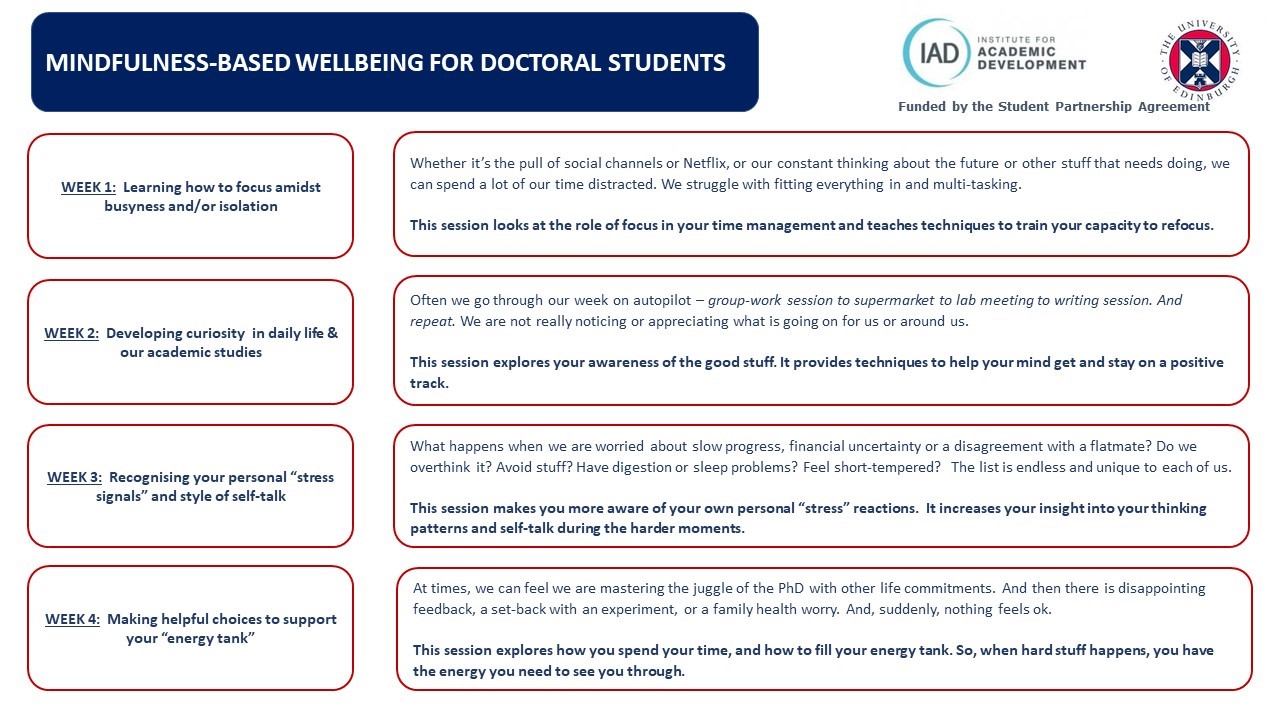
In this extra post, Anne MacDonald, shares insights into the process of designing a mindfulness programme to support Doctoral students in their PhD journey. Anne – a PhD student at the Moray House of Education and Sport – spearheaded this initiative through the Student Partnership Agreement 2022.
I was initially inspired to apply for the Student Partnership Agreement funding following a series of programmes I ran for Sports Union students in 2021 (thanks to the Student Experience Grant). Having noticed that many of the wellbeing challenges aired by the sports union students were relevant to all students, it became clear that the programme could benefit other cohorts of students across the university.
Spurred on by my own experiences as a PhD student, I wanted to design a programme adapted specifically to Doctoral students. Being a big believer in the spirit of “stronger together” and knowing that the University Mindfulness Chaplain, Dr Kitty Wheater, had been teaching mindfulness to university students for many years, it made sense to put our heads together…and so our application for the SPA funding took shape!
The programme’s purpose was to introduce Doctoral students to mindfulness-based wellbeing approaches which could support them as they navigate the inevitable highs and lows of the PhD journey.
At this point it might be worth a few words on what mindfulness is and how it is thought to “work”. It is a little more nuanced than simply being a relaxation technique!
Mindfulness is a practice which hones our attention and awareness (of ourselves, others, and our environment) and it encourages developing a friendly approach towards what we notice. With this friendly awareness comes the possibility to practice making more helpful choices for our wellbeing, e.g., taking a break and doing something energising instead of plodding on relentlessly without a break, submitting an imperfect chapter to your supervisor rather than holding on to as you don’t deem it good enough…
The visual below shows the objectives of the programme in more detail.

Together, Kitty and I set about designing the programme curriculum for Doctoral students. Coming from varied backgrounds and trained in slightly different 8-week evidence-based mindfulness curriculums meant that we were able to combine our knowledge, experiences, and ideas.
To make the programme as accessible as possible, I was keen to continue the 4-week online format of the sports union programme, rather than the 8-week evidence-based programme.
To make it relevant and appealing to students, we created programme communication designed to be explicit about how it might be useful to PhD students. Each week had a clear and relevant theme, and the experiential and practical nature of the programme was emphasised. See the visual below for the weekly themes.

With the curriculum and communication co-created, the next step was to work with the IAD team to communicate and enable sign up to the programme. I was grateful for the openness of Louise McKay (Doctoral Programme Manager) to offer the programme and Julie Daubenspeck and Carla Perera were very helpful during the process of sign up and attendance.
I delivered two programmes – one in May and one in November 2022 with PhD students attending from a wide variety of Schools and years of study.
At the end of each programme, I invited the students to complete a feedback form to gauge the usefulness of the programme as well as the programme’s appropriateness in terms of purpose and format. I also made them aware of the University’s wider offering on mindfulness at the Chaplaincy: https://www.ed.ac.uk/chaplaincy/mindfulness.
Overall, it appears the programme was well-received, and this feedback made my heart sing:
“The program was very useful in highlighting how I can manage my response to the overwhelm and in noticing that the tasks are not inherently negative, but they are made negative due to my anxious response. This has potentially made a difference for me in continuing the PhD rather than quitting.”
Others cited benefits beyond wellbeing, for example:
“It helped me focus, think, be more creative and productive.”
This didn’t surprise me; the evidence from my own PhD research suggests that mindfulness-based approaches can have positive effects in the workplace beyond wellbeing (e.g., enhanced interpersonal skills, increased task focus).
Kitty and I continued working together through supervision meetings during and after the programmes. These were useful to discuss the commonality of PhD students’ challenges (e.g., feelings of overwhelm, time management difficulties, anxiety about supervisor meetings) and the challenges of delivering the programme (e.g., nonattendance – an average of 58% of sign-ups attended week 1; drop-off in adherence during the course – an average of 44% finished the courses).
So, whilst the programme helped a good number of PhD students, there is clearly an opportunity to make mindfulness-based approaches more appealing and accessible to this cohort. Indeed, the mission continues to make exercises for the mind as integrated into the fabric of our day as physical exercise may be.
I would like to conclude with a series of thanks: to Professor Catherine Bovill for her initial guidance and enthusiasm; to Dr Kitty Wheater for the friendly space for exploration and discussion; to Laura McKay, Julie Daubenspeck and Carla Perera at the IAD for their help in the programme roll out; and to Jenny Scoles for guidance on writing this blog.
 Anne MacDonald
Anne MacDonald
Anne is a PhD candidate at the Moray House School of Education and Sport. She is passionate about facilitating workplace wellbeing and performance and curious about the potential of mindfulness-based approaches in this endeavour. With a background in industry as a board member and HR Director, Anne is also trained as a mindfulness teacher through the Centre of Research and Practice at Bangor University, and is an ICF accredited Executive coach.

[…] https://www.teaching-matters-blog.ed.ac.uk/mindfulness-based-wellbeing-for-doctoral-students/ […]